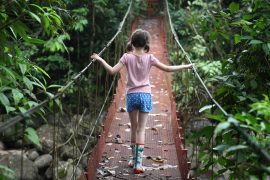By Dr. Rosie Knowles
We are certainly living in challenging times with the coronavirus, a global pandemic, schools and businesses being closed, restrictions placed on social activities, increased pressure on the health services, and a high level of collective anxiety.
Three of us in the local Sheffield sling scene felt inspired to write this blog post. We have all experienced how the closeness and connection of hands-free babywearing can help people survive very difficult situations and found it very therapeutic and calming. We wanted a community resource to serve our local community at this complicated and scary time.
In the last few days there have been several references and comparisons made to “being at war” with the coronavirus, and how this government has to respond as if it were a wartime government, with sweeping powers over its people and institutions. This thread (contains swearing) on Twitter helped us make the connection between this “wartime” analogy and our own personal response to the situation. Several of the authors of this post have experienced trauma-based mental health problems for a number of years, and as part of their recovery and healing they have done a lot of research into this area, as have those of us in supportive and educational roles.
We can all see the effects of trauma in people’s behaviour, actions and reactions. We can see it in our own reactions.
It is pretty common knowledge how many soldiers experience trauma during war, so it is not a big stretch to see how we, as untrained and unprepared civilians, are going to be experiencing traumatic reactions to our attempts at fighting the pandemic caused by coronavirus (Covid-19).
The human brain has several fall-back mechanisms to ensure the safety and survival of the body when the world feels very unsafe. They developed millennia ago and can be described as our “cave people” instincts: hunting and gathering and fighting for survival and self-protection.
- The brain can suppress feelings of helplessness and terror and put the body onto a form of autopilot, keeping it functioning whatever is going on.
- The brain can move the body into a heightened state of action, helping it to flee from danger or protect itself and its loved ones. The brain can freeze the body into stillness if flight is impossible.
- The brain can even detach the mind from what is happening to the body (dissociation).
These all have long term consequences for the body’s physical and mental health, which are closely connected.
Trauma is powerful; and knowing more about its effects allows us to find ways to heal ourselves and to have compassion and understanding for others.
People who are panic buying toilet roll or dried goods are displaying a reaction to the trauma they are experiencing: the fear, anxiety and uncertainty that come due to a lack of reliable information and an unseen enemy. They are not making a conscious choice to be selfish or refusing to think of others. The cognitive part of their brain has lost its normal control over their reactions; they are not really thinking at all, but reacting to their internal fears and protecting themselves.
Other people are carrying on as normal, as if nothing was happening. This is another form of response to trauma, denying that the traumatic situation even exists.
It can be hard to believe that the storm is building fast on the horizon, when the sun is still shining in your back yard. It can feel easier to ignore it than to watch it coming and have to deal with it and make changes to normal life. Some people can feel detached from the world entirely, as if it isn’t real or that it’s all part of a story, a form of derealisation.
These are not “thought through”, rational reactions, but automatic responses to traumatic events for self-protection.
The effects of trauma can be physical as well as mental
Stress and anxiety have physical consequences too: racing heart, chest discomfort, burning feelings, sweating, insomnia, loss of appetite, etc. Some people notice odd symptoms that they would normally ignore but take on extra significance during all the uncertainty. Normal life feels exhausting, because living with trauma, fighting a threat and trying to protect yourself is draining and takes up a huge amount of energy.
Does this feel like your experience?
Right now, as the news gets worse and the impact is being felt, our brains have effectively rung the fire alarm. When this happens, our logical cognitive brains shut down and focus on fighting the fire (or the trauma), and our bodies respond. Our children will also be experiencing this trauma, seeing the normal routines of their lives upset, watching and feeling their parent’s tension, so their reactions may seem unusual, and their behaviour out of place.











